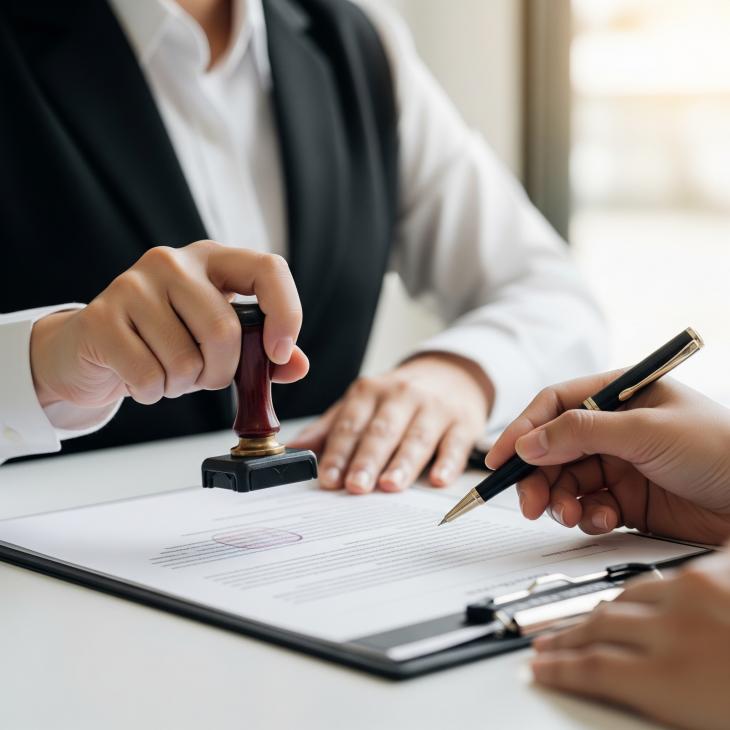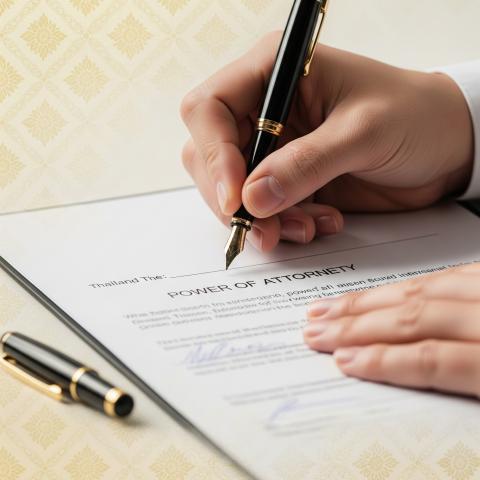Understanding the role of a Notary Public in Thailand is crucial for foreigners dealing with legal or official documentation. While the system differs from that in many Western countries (Thailand doesn't have "Notaries Public" in the same sense, but rather "Notarial Services Attorneys" licensed by the Lawyers Council of Thailand), the function of authenticating documents remains vital.
A Notarial Services Attorney in Thailand is a licensed lawyer authorized to perform notarial acts. Their primary role is to act as an impartial witness to the signing of documents and to verify the authenticity of signatures and documents. This process helps prevent fraud and ensures the documents can be trusted by authorities and institutions, both within Thailand and internationally.
Foreigners in Thailand often require notary services for a variety of situations. Here are some common instances and the types of documents involved:
When You Might Need Notary Services:
- Visa and Immigration Matters: Certain visa applications or immigration procedures may require notarized documents, such as sponsorship letters or copies of personal documents.
- Business Transactions: Forming a company, entering into contracts, or other business dealings often necessitate notarized agreements, resolutions, or powers of attorney.
- Property Transactions: Buying or selling property may involve notarizing sale agreements, lease agreements, or related documents.
- Legal Proceedings: Affidavits, statutory declarations, and other documents used in court or legal processes frequently require notarization.
- Personal Affairs: Documents like last wills and testaments, or authenticating copies of educational certificates or passports for official use abroad, often need a notary's seal.
Common Documents Requiring Notarization for Foreigners:
- Affidavits: Written sworn statements of fact. For example, an affidavit of single status or an affidavit for a lost passport.
- Powers of Attorney (PoA): Documents authorizing someone to act on your behalf in legal or financial matters. This is common if you cannot be physically present to sign documents.
- Contracts and Agreements: Business contracts, lease agreements, loan agreements, or prenuptial agreements may require notarization to enhance their legal standing, especially if they are to be used internationally.
- Certified True Copies: Copies of original documents (like passports, driver's licenses, academic degrees, company registration documents) that are certified by a notary as being true and accurate copies of the original.
- Statutory Declarations: Written statements of fact that a person declares to be true.
- Application Forms: Certain application forms for official purposes might require a notarized signature.
- Consent Letters: For example, a parental consent letter for a minor to travel.
- Translations: While the notary may not translate the document themselves, they can notarize the translator's affidavit affirming the accuracy of the translation.
The Notarization Process in Thailand:
Typically, the person whose signature is being notarized must appear in person before the Notarial Services Attorney. You will need to present valid identification, such as your passport. The attorney will verify your identity, witness your signature (or confirm that the signature on a document is yours), and then affix their seal and signature to the document. This signifies that the necessary checks have been performed.
It's important to note that if a document notarized in Thailand is to be used in a foreign country, it may require further legalization by the Thai Ministry of Foreign Affairs and then potentially by the embassy of the country where the document will be used. This is because Thailand is not a signatory to the Hague Apostille Convention.
Engaging a reputable law firm like PS Law & Business, which offers notarial services, ensures that your documents are handled professionally and in accordance with Thai law, providing you with the necessary legal authentication for your specific needs.
FAQ Section:
Q: What is the difference between a Notary Public and a Notarial Services Attorney in Thailand?
A: Thailand does not have "Notaries Public" in the same way many Western countries do. Instead, licensed lawyers can undergo specific training to become "Notarial Services Attorneys" authorized by the Lawyers Council of Thailand to perform notarial acts.
Q: Why do I need to notarize documents as a foreigner in Thailand?
A: Notarization provides an official verification of the authenticity of a document or signature. This is often required for visa applications, business contracts, property deals, legal matters, and when submitting documents to foreign authorities to prevent fraud and ensure legal validity.
Q: Can a document signed outside the presence of a Notarial Services Attorney be notarized?
A: Generally, for signature verification, the person must sign in the presence of the Notarial Services Attorney. However, for certifying true copies or authenticating existing documents, the attorney will verify the original and certify the copy. It's best to consult with the attorney beforehand.
Q: How long does notarization take?
A: The time can vary depending on the complexity and number of documents. Simple notarizations might be completed relatively quickly, often within an hour, provided you have an appointment and all necessary paperwork and identification.
Q: Are documents notarized in Thailand valid internationally?
A: Documents notarized by a Thai Notarial Services Attorney are generally accepted internationally. However, for use in many foreign countries, they may require further legalization by the Thai Ministry of Foreign Affairs and sometimes by the embassy of the destination country, as Thailand is not part of the Hague Apostille Convention.
Q: What should I bring to a notarization appointment?
A: You should bring the original document(s) to be notarized and your valid original passport for identification. It's advisable to confirm any other specific requirements with the law firm when scheduling your appointment.
External Links Section:
- Thai Ministry of Foreign Affairs: For information on document legalization for international use.
- Lawyers Council of Thailand: The regulatory body for lawyers and Notarial Services Attorneys in Thailand (Note: English content may be limited; it's best to check for the most current English resources or contact them directly).


